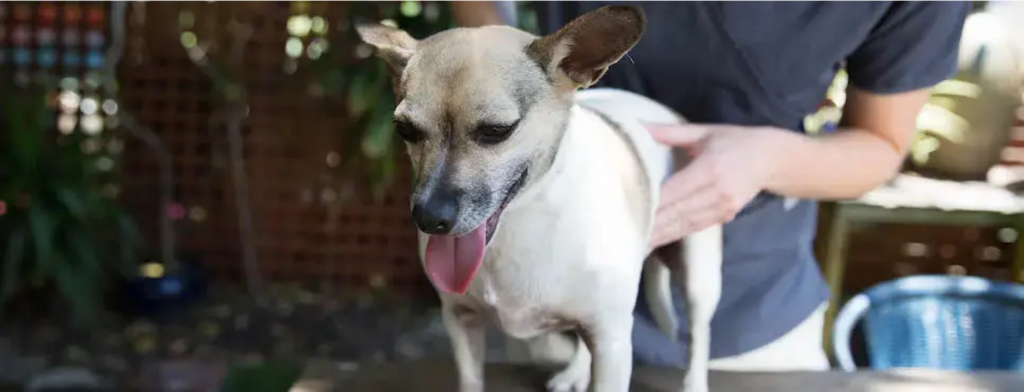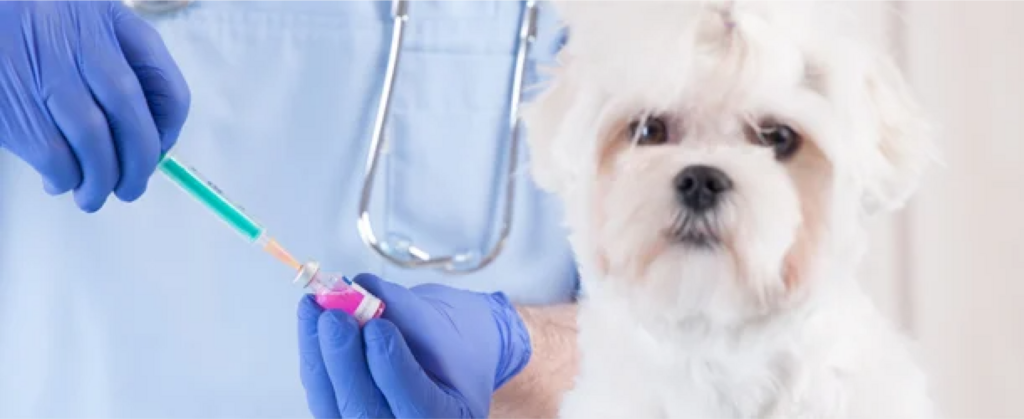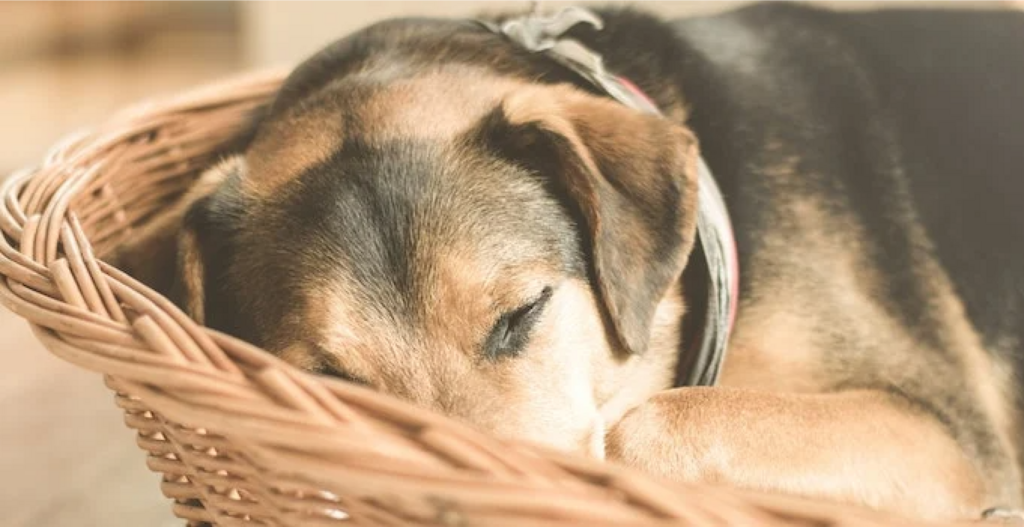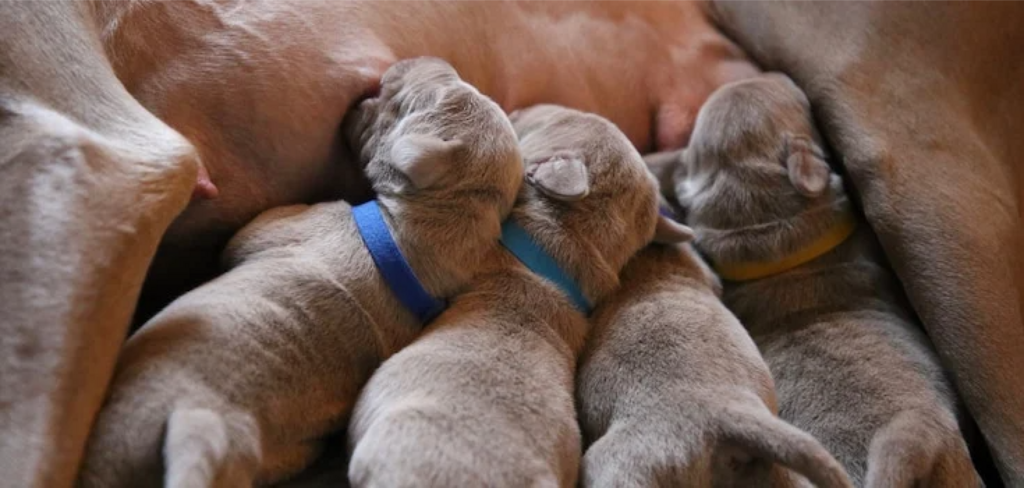Last Updated: 24/06/2025
Pregnant Dog Guide
What to expect when your dog is expecting! Our vets guide to pregnancy in dogs.
Author: Dr Carla Paszkowski BVSc (Hons)
Reading Time: 14 minutes - short read
Welcoming a litter of puppies is a truly special and heartwarming journey. Guiding your dog through her pregnancy can be an incredibly exciting and rewarding experience, but it also comes with the important responsibility of ensuring her health and safety every step of the way.
To help you feel confident and prepared, we have assembled a complete guide that walks you through all the essentials. Below, you'll find detailed information on crucial topics such as providing the right nutrition for a healthy mum and pups, understanding safe parasite prevention, managing vaccinations, and recognising potential complications. We also cover recommended products to help you prepare for the big day, and much more, giving you the knowledge you need for a smooth and happy experience.
In this article
- The Basics: How Long Are Dogs Pregnant For?
- Signs of Pregnancy in Dogs
- Nutrition During Pregnancy
- Parasite Prevention Schedule: When To Worm A Pregnant Dog
- Parasite Prevention Products: Which Preventatives Are Safe For Pregnancy?
- Vaccinations
- Whelping: What To Expect At Labour
- Possible Complications
- Essential Pregnancy Checklist
How long are dogs pregnant for?

Pregnancy in dogs lasts for around 60 days. Whelping (giving birth) occurs 59-63 days after a successful mating.
The reproductive cycle of the dog isn't the same as that of humans. Unlike humans, dogs don't experience monthly cycles and they don't menstruate. Instead, undesexed female dogs usually experience a 'heat' twice a year, during which they ovulate and are fertile. Their first 'heat' may occur as early as 5 or 6 months of age, however most dogs typically have their first heat around 7-12 months.
How to tell if your dog is on heat:
When a bitch is 'on heat', she will exhibit behaviour such as restlessness, crying, 'sookiness', and may try to escape your yard in search of a mate. Physical signs may include a swollen vulva and a bloody discharge. Entire (non-desexed) males are very receptive to the pheromones of an on-heat bitch, and may 'go crazy' trying to reach her.
Did you know: Female dogs often mate with multiple male dogs when they are on heat, and can fall pregnant to multiple males. This means they can have one litter containing pups with different fathers! Before you spill your tea recoiling in horror at the thought of such uncouth promiscuity, think about how great this is for increasing genetic diversity, and broadening the gene pool!
To find out more, read through our guide to Dogs on Heat.
How to tell if a dog is pregnant

How can you tell if your dog is pregnant? Unfortunately, there isn't an easy at-home urine test to diganose pregnancy in dogs like there is for humans. In most cases, your female is likely to be pregnant after a successful mating due to the efficient reproductive cycle of the dog. To be sure, you can get a blood test or an ultrasound at your vet from day 21-25 after mating.
Signs that your dog may be pregnant include:
Early Signs: In the first few weeks, you may not notice any signs. Nausea (morning sickness) can occur in some dogs, but only for a few days during the 3rd or 4th week. Your dog may seem tired or less motivated to play, and she may have a reduced appetite.
Around day 30: You may notice weight gain, enlarged teats with some mammary leakage, and some clear or opaque mucusy discharge from her vulva.
Around day 40: The abdomen will start to become noticeably larger - however this can vary between dogs.
How can you tell how many puppies your pregnant dog is carrying?
The only accurate way to assess how many puppies your dog will have is via ultrasound or xray at your vet. Your vet will also be able to perform an abdominal palpation, however this is not always accurate.
What to feed a pregnant dog

What should you feed a pregnant dog? Proper nutrition is absolutely vital for dogs during gestation. When a female dog is towards the third trimester, her nutritional needs change as the litter inside her grows at a rapid rate. She requires higher levels of energy, calcium, phosphorus, and vitamins.
But before you go in search of recipes for pregnant dogs, or reach for dog prenatal vitamins, know this: Any premium food for small or medium breeds formulated for 'growth' is also balanced for pregnant and lactating bitches. Because a pregnant or lactating female has such similar nutritional requirements to young infant pups, you can feed a premium puppy food as it contains all the nutrients your gestating girl needs.
It's very important that even if you have a pregnant large breed dog, that you feed her a small or medium breed food suitable for 'growth', or puppies. Large breed 'growth' or 'puppy' diets have an incorrect balance of calcium and phosphorus, which fails to support proper bone growth in unborn puppies or healthy milk production for the mother.
Nutrition during Pregnancy:
- In the first two trimesters (prior to week 6), a pregnant dog can be maintained on a regular premium adult food. However, it is vital that she doesn't lose weight in this period. If your pregnant dog is losing body condition, a transition onto a puppy food may be required sooner.
- In the final trimester (from 6 weeks onwards), a puppy food is required - not just because her nutritional demands increase by 30-60%, but also because the puppies grow and take up more space in her abdomen, which means she may not tolerate as much food in her stomach and require a much more nutritionally-concentrated diet. However, keep a close eye on her weight at this point. It's important to ensure your girl remains active, because obesity can cause birthing difficulties. Make sure you don't select a 'large breed puppy' formula at this point, even if your girl is a large breed, as these do not contain an appropriate calcium to phosphorus balance. An 'all breed', small or medium puppy formula is best.
- After whelping: during lactation, the mother's energy requirements will actually increase even more. 3-5 weeks after whelping she may require 2-3 times the calories of a normal adult. Maintain her on the same premium puppy food during this period, and consider offering some puppy milk or puppy formula and a little extra meat such as cooked chicken breast. The mother's energy requirement will reduce and return to normal by about 8 weeks post-whelping - once pups are weaned.
What to feed in the third trimester and during lactation: it's important to seek a premium puppy food. Don't be tempted to save money and opt for a cheap pregnant dog food. For the sake of a few dollars, it could be the difference between producing a litter of thriving pups and a litter with stillborn pups. Your girl is growing new life inside her and really needs quality food now more than ever!
Best food for a pregnant dog
From 6 weeks onwards, your dog requires a premium quality puppy food. Our top recommendations for pregnant dog food at this stage include:
1. Instinctive Bite Puppy Food. Each Instinctive Bite recipe is designed with a minimum 49% meat content to nourish your dog's carnivorous side - and all meat and vegetables are sourced from Australia. Plus, beneficial ingredients such as yucca extract and chicory root inulin provide beneficial fibre and a prebiotic boost. It's also complete and balaned for puppies in accordance with international and AAFCO feeding guidelines, to keep your vet happy too!
2. Advance Puppy Food. Advance's super premium, Australian made puppy food is complete and balanced, and comes vet recommended for growing pups. Advance is also one of our best value premium diets, with extra large 40kg bulk value bags to ensure families on every budget can afford premium quality.
3. Hills Science Diet Puppy Food. Hills Science Diet creates complete and balanced wet food in tins and sachets, as well as dry kibble. As one of our most trusted and vet-recommended brands, Hills food is tasty, nutritious, and made with high quality ingredients.
4. Royal Canin Puppy Food. This premium puppy food range that contains optimal levels of energy and minerals to support healthy bone and joint development. Royal Canin is particularly known for it's breed specific formulas, available for Cavaliers, Pugs, Poodles, and many more.
5. Black Hawk Puppy Food. Black Hawk puppy food contains functional ingredients from nature with known beneficial properties like blueberries, dried kelp and rosemary. With added food grade emu oil, Black Hawk Lamb & Rice Puppy is rich in omega fatty acids for healthy skin and a shiny, lustrous coat.
A high quality, premium puppy food brand formulated with optimal levels of calcium, phosphorus and energy for growth and pregnancy.
Advance puppy food is Australian made and premium quality, with optimal levels of calcium, phosphorus and nutrients to support growing foetuses.
Formulated with premium meats, this Australian made puppy food contains all natural ingredients to nourish pregnant females.
Tailored with highly digestible protein, antioxidants and prebiotics, as well as balanced levels of calcium and phosphorus to promote healthy bone and joint development.
Can you worm a pregnant dog?
Yes! While all forms of parasite prevention are important during pregnancy and lactation, worming is particularly vital due to the risk of infection to pups. Flea and tick prevention should remain as per usual throughout your dog's pregnancy - provided your chosen preventative is safe for pregnancy (read more about this below).
When to worm a pregnant dog?
- Leading up to a mating, a female dog should receive worming as normal (ideally monthly for intestinal worms and heartworm).
- During pregnancy, worming should continue as normal plus an extra dose 10 days prior to giving birth (approximately 50 days after mating).
- While nursing, the mother dog should be wormed every 3 weeks. See our recommendations for safe wormers during pregnancy below.
When to worm newborn puppies:
Pups need to be wormed at 2 weeks of age, and then every 2 weeks until 12 weeks of age. At 12 weeks they should receive their first heartworm treatment. After 12 weeks of age, they can receive worming every month until 6 months of age, and then 3 monthly for life. Read a full guide to puppy parasite prevention in our Complete New Puppy Guide.
Which parasite preventatives are safe for pregnancy?
While most parasite preventatives are generally believed not to cause issues during pregnancy, only some have actually been tested to prove their safety. Therefore, we recommend only using products that have had their safety evaluated during pregnancy and lactation.
A broad wormer which covers all intestinal worms is recommended for a pregnant dog. Worms of concern include hookworm, whipworm, roundworm, and tapeworm.
Flea and Tick Preventatives Safe for Pregnant Dogs
All in One Parasite Preventatives Safe for Pregnant Dogs
Please note that products not included in these lists are not necessarily "unsafe", rather they do not have a "safe for pregnancy" statement on their label. This may mean they have simply not received testing to establish safety*.
*Some medications marked safe are not recommended for use at certain stages of pregnancy, always follow the label directions.
Vaccinations

An up-to-date vaccine schedule is vital for pregnant dogs. Parvovirus is a common cause of death in puppies, but it is easily preventable. Vaccinating the mother prior to whelping creates parvovirus antibodies, which she will transfer to her pups.
When to vaccinate a pregnant dog: If a pregnant bitch has not been vaccinated at some point within the previous 10-12 months, a parvovirus booster is recommended prior to mating. For cases of unexpected pregnancies, it's important to vaccinate no later than 6 - 7 weeks into the pregnancy.
For information about when to vaccinate newborn pups, see our Newborn Puppy Care Guide and Complete New Puppy Guide.
Whelping: What To Expect At Labour

Labour in dogs occurs in 3 phases:
Stage 1: Primary Labour
Stage 1 usually lasts for 12-36 hours. During this phase, you may notice nesting behaviour; where the female will seek out a safe 'den'-like space to settle into. Try to provide blankets and newspaper if you see this behaviour. Some females prefer to be alone in their nest, others may seek out the company of their owners.
Contractions will begin here and your dog may become restless, standing and sitting frequently, and she may vomit. Oxytocin is released in her body which causes the uterus to contract.
Stage 1 tends to last longer for first-time mums than in dogs who have had a litter before.
Stage 2: Secondary Labour
Stage 2 is where birth of the pups occur, and it may last anywhere from 2-5 hours, depending on how many pups are in the litter. Labour consists of active straining and resting. The active straining shouldn't last longer than 15-20 minutes at a time - any longer and there may be an issue. The resting time can vary between bitches.
As each pup is born, it will first appear in its amniotic sac at the vulva. The mother will lick and chew until the sack is broken, and she will also eat the umbilical cord and amniotic sac contents. The mother should then lick and roll her newborn pup, which stimulates breathing. This is completely normal behaviour, and your girl will know how rough to be with her pups.
If your girl doesn't seem to be attending to her pup within a few minutes of giving birth, you should ensure all the sack and membranes are removed from the pup's mouth. You should also try to stimulate breathing by gently and quickly rubbing the pup over with a dry towel. Keep the pup's head pointed downwards so that any fluid can drain out of the nose and mouth.
If you need to separate the pups from their mother, ensure they are kept warm at around 30-32 degrees C.
Stage 3: Post-Birth
The final stage of labour involves the contraction of the uterus to discharge the fluid and excess membranes. For the first 48 hours after whelping, the discharge is normally a green or black colour. After this, the discharge will appear as a bloody colour like red wine for a few weeks. The discharge should not have an excessive odour - if you are concerned always seek veterinary attention.
A vet check should be scheduled 24 hours after the birth of the final puppy. Your vet will examine your dog and check for any retained foetuses, assess adequate milk production, and check her vitals. The pups will also be examined and checked for any physical abnormalities.

In the days after giving birth
After the birth stage, your girl will be exhausted and looking to feed her babies. Provide her with clean blankets and a quiet, undisturbed environment free from loud noises. Some dogs may become anxious or even aggressive while feeding their pups, so it's best to respect her space and keep children away.
After giving birth, provide food ad libitum to your dog so that she can eat as much as she wants. Leave dry food out for her throughout the day, but remove any moist or canned food that doesn't get eaten after 20 minutes. Of course, fresh water should be provided at all times and close by.
Your dog may have green or black diarrhoea for a few days if she ate the foetal membranes at birth. This is normal and should resolve after a few days to weeks.
Possible Complications: When to Seek Veterinary Attention

Possible Complications During Labour
If you notice any of the following signs during labour, it's important to seek veterinary attention:
- A period of active pushing longer than 30 minutes which does not result in the birth of a pup
- Pale gums
- Vulval discharge with a foul odour
- Seizures
Complications During Lactation
Problems to watch out for in nursing bitches include:
1. Mastitis: infection of the mammary gland. Signs of mastitis include a swollen, hot, firm and painful teat. Often the affected teat/s will not produce milk, or may produce a thick discharge with blood clots. One or more teats may be affected, and you should not allow pups to feed from any infected glands as they may become sick.
2. Pyometra or Metritis: an infected uterus or inflamed uterine lining, often caused by retained foetal membranes. Pyometra is a medical emergency and usually requires a hysterectomy (spay). Signs to watch out for include inappetence, fever, vomiting, or odourous vulval discharge.
3. Hypocalcaemia: also known as 'milk fever'. This can occur during pregnancy or lactation due to calcium lost from milk production. It is more common in small breed dogs nursing large litters. Signs of hypocalcaemia may include muscle tremors, hyperexcitation, panting, weakness, vomiting, or seizures. Hypocalcaemia requires calcium substitution via an IV drip. Low calcium can usually be avoided by feeding a high quality puppy food, however you may wish to provide extra puppy milk like DiVetelact mixed in with your bitch's food.
4. Agalactica: a lack of milk production. If your dog isn't producing any milk, you may notice excessive crying from the pups and sunken bellies rather than nice plump little abdomens. Pups will quickly become hypoglycaemic without milk for evey just a few hours, so ensure supplementation with a puppy milk formula is provided immediately. A lack of milk production can indicate that your girl is debilitated or malnourished, so seek veterinary attention immediately if this is the case.
5. Poor Mothering: Not all dogs will take to motherhood as naturally as others. Some dogs may not show diligent mothering to their pups and may not ensure all pups are getting fed. Keep a close eye on feeding as you may need to take over and feed them if this is the case. Unfortunately, poor mothers tend not to develop a mothering instinct as they grow, so it is not ideal to breed from them again.
The Essentials: A Complete Pregnancy Checklist
It's important to keep the following items on hand during each stage of your dog's pregnancy and nursing stages: prior to mating, during pregnancy, and during lactation / nursing.
1. Essentials for a dog prior to mating
1. Premium, vet-recommended Adult Dog food (prior to 6 weeks of gestation. Puppy food is required from week 6 of pregnancy.)
2. A broad spectrum wormer.
3. Vet-recommended Dental Care products
Your girl will need top quality nutrition to ensure she's in peak condition prior to falling pregnant. From Hills to Instinctive Bite, click the image above to view our top recommended adult diets.
Keep your girl eating well with some premium wet food in addition to premium dry food. Wet food can help keep your dog hydrated, and it also adds variety. Click the image above to view our top recommendations for adult wet food.
Ensure your dog's worming is completely up to date to reduce the risk of parasites. Any parasite can reduce your dog's immunity and overall health.
It may seem strange, but any form of dental disease can affect reproductive health. Good oral health can help increase your dog's chance of falling pregnant and carrying a successful pregnancy to term.
2. Essentials for a dog during pregnancy
1. Premium, vet-recommended Puppy food (from week 6 of pregnancy onwards).
2. A broad spectrum pregnancy-safe wormer.
3. A high quality Milk Replacer (if your vet recommends it for calcium supplementation)
Puppy food is important during pregnancy as it contains optimal levels of calcium and nutrients to support growing foetuses. Click through the link to view a range of recommended premium puppy diets for pregnant dogs.
Wet puppy food will help add some variety to your pregnant girl's diet and keep her eating well. Be sure to alternate between a variety of flavours to allow her growing pups exposure to different meat proteins.
Your dog should be wormed as normal and then again 10 days prior to mating. We recommend a broad spectrum wormer such as Drontal or Milbemax.
3. Essentials for a dog nursing newborns
1. Premium, vet-recommended Puppy food - both Mama dog and pups can eat the same food (once the little ones are old enough!)
2. A broad spectrum lactation-safe wormer.
3. A high quality Milk Replacer - keep some on hand in case the puppies need it due to low milk yield.
4. Plenty of fresh water to keep Mama dog hydrated.
Puppy food is balanced for mum and her pups, who will start eating solid food at around 4 weeks of age. Click through the link to view a range of our top recommended premium puppy diets for mum and bubs.
Having plenty of fresh water nearby is important to ensure your lactating dog maintains hydration. A water fountain with a built-in filter is the perfect option for keeping your girl hydrated as it can encourage drinking.
Your newborn pups will need to be wormed at 2 weeks of age, so make sure you've got a trusted and vet-recommended puppy wormer on hand.
Further Reading
Want to read more? Check out our other articles:
Premium Pet Food: Is It Worth It?
Guide to Fleas, Ticks and Worms
History
Our experts continually monitor the health and wellness space and we update our articles when new information becomes available.
Tue Jun 24 2025
Edited by Dr Gillian Hill BVSc (Hons)Dr Carla Paszkowski BVSc (Hons)
Veterinarian
Dr. Carla graduated from the University of Queensland in 2013 with a Bachelor of Veterinary Science and worked for a number of years in small animal clinics across South East Queensland. While Carla enjoys most facets of clinical veterinary work, she holds a special passion for feline medicine, pocket pets, and nutrition.

